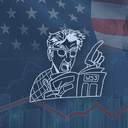In this episode of The Grumpy Economist Weekly Rant, John Cochrane explains what really drives inflation. Greed, monopolies, and supply shocks only affect relative prices — the cost of one item versus another — which are like waves on the ocean. Inflation, however, is like the overall ocean level, determined by fiscal and monetary policy. Pandemic spending and trillions in post-pandemic stimulus lifted the ocean, pushing all prices upward, not just individual waves. To understand inflation, you have to watch the whole ocean, not just the waves on the surface. Cochrane stresses that the level of the ocean reflects the choices governments make about money, debt, and spending, shaping the economic environment for everyone.
Transcript
John Cochrane: Hi, I’m John Cochrane, senior fellow here at the Hoover Institution. Welcome to The Grumpy Economist Weekly Rant.
Let’s talk today about inflation.
Where did the recent inflation come from? Well, politicians say greed: “monopoly, price gouging, hoarders” — all the usual suspects. Our central bankers said “supply shocks, relative demand shocks.”
What does all that mean?
The problem with all these stories is these are relative prices: one price versus another, not the price level.
Yeah, we had a pandemic. People wanted Pelotons and it was hard to make Pelotons. They didn’t want to go out to dinner. So, the price of Peloton has to go up relative to the price of restaurant food and to wages.
But why should all prices go up?
Inflation is the part of all prices that goes up together. Or equivalently, it’s the value of money. Inflation really isn’t about prices. It’s about the value of money.
When we look at one price versus another, what we’re looking at is the waves on an ocean. Maybe Pelotons have a high wave and restaurant dinners have a low wave. And that’s true for greed, monopoly and so forth — that’s all an effort to raise one price relative to another.
But one price relative to another doesn’t explain overall. Having one wave behind and another wave below doesn’t tell you what is the level of the overall ocean.
What’s the level of the overall ocean? Fiscal and monetary policy. We had to have enough money to pay the higher prices for everything, and the government gave us that money.
That’s where the inflation comes from. In the pandemic and afterwards, the government flooded the economy with $5 trillion of money and new debt without much plan for paying it back and we all went out to try to spend it. Some of that was a good thing, but that’s what happened.
So, don’t look for one price relative to another when you want to understand inflation, look for what sets the level of the overall ocean, namely fiscal and monetary policy, which often responds to those shocks, but it responds to the shocks by raising the level of the ocean.
Inflation is always a choice. Our governments sometimes choose to inflate, to protect us from the shocks of one thing versus another. Sometimes they don’t.
If we didn’t like the inflation we just saw during and after Covid, we need to prepare to make better choices. Spend more wisely. Have plans to pay back the debt so people will hold on to it, rather than try to spend it. But it’s always a level a question of the overall fiscal and monetary policy that causes inflation.
Let’s choose better next time.
Thanks for listening. And don’t forget to click the subscribe button.
John H. Cochrane is the Rose-Marie and Jack Anderson Senior Fellow of the Hoover Institution at Stanford University. An economist specializing in financial economics and macroeconomics, he is the author of The Fiscal Theory of the Price Level. He also authors a popular Substack called The Grumpy Economist.
